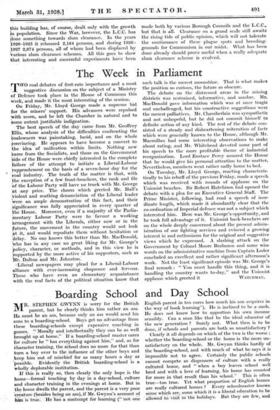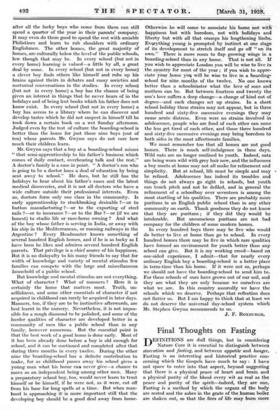Boarding School
and Day School MR.. STEPHEN. GWYNN is sorry for the British parent, but he clearly thinks_ him rather an ass. He must be an ass, because only an ass would send his sons to a boarding-school. Boys get no advantage from these boarding-schools except expensive coaching in games. ," Morally and intellectually they can fie as well brought up at.home." If a boarding-school master cares for culture he " has everything against him," and, as for Character training, the school does no more for that than turn a boy over to the influence of the other boys and keep him out of mischief for as many hours a day as possible. Evidently the British hoarding-school is a wholly deplorable institution.
If this is really so, then clearly the only hope is the home—formal teaching by day in a day-school, culture and character training in the evenings at home. But in the home dwells the parent, and the parent is a very poor 'creature (besides being an ass), if Mr. Gwynn's account of him -is true; He 'tali a Coritenitot for learning (" not one English parent in ten cares how much his son acquires in the way of book learning"). He is inclined to be a snob. He does not know how to apportion his own income sensibly. Can a man like that be the ideal educator of the new generation ? Surely not. What then is to be done, if schools and parents are both so unsatisfactory ?
Clearly it all depends on which of the two is the worse : whether the boarding-school or the home is the' more =- satisfactory on the whole. Mr. Gwynn thinks hardly of the boarding-school, and with much of what he says it is impossible not to agree. Certainly the public schools cannot compete as dispensers of culture with a really cultured home, and " when a boy leaves school well bred and with a love of learning, his home has counted for more in that result than his school." This is often true—too true. Yet what proportion of English homes are really cultured homes ? Every schoolmaster knows some which are, some which it is a liberal education to be allowed-' to' visit in-‘the holidays. But they are feW, and after all the lucky boys who come from them can still spend a quarter of the year in their parents' company. It may even do them good to spend the rest with amiable Philistines and learn to rub shoulders with ordinary Englishmen. The other homes, the great majority of homes, are culturally below the level of the public schools, low though that may be. In every school (but not in every home) learning is valued—a little by all; a great deal by some. In every school (hut not in every home) a clever boy finds others like himself and rubs up his brains against theirs in debates and essay societies and nocturnal conversations in the studies. .In every school (but not in every home) a boy has the chance of being given an interest in things that he never hears of in the holidays and of being lent books which his father does not know exist. In every school (but not in every home) a boy has access to a library where he can discover and develop tastes which he did not suspect in himself till he took down a certain book on a wet Sunday afternoon. Judged even by the test of culture the boarding-school is better than the home for just those nine boys (out of ten) whose parents Mr. Gwynn says do not care how much their children learn.
Mr. Gwynn says that a boy at a boarding-school misses " that semi-apprenticeship to his father's business which comes of daily contact, overhearing talk and the rest:' A doctor's family is a case in point. " A doctor's son who is going to be a doctor loses a deal of education by being sent away to school." He does, but he still has the holidays to hear about his father's cases and the latest medical discoveries, and it is not all doctors who have a wide culture outside their professional interests. Even so, doctors form only one class in the community. Is early apprenticeship to stockbroking desirable ?—or to button manufacturing ?—or to the exporting of steel rails ?—or to -insurance ?—or to the Bar ?—or (if we are honest) to studio life or race-horse owning ? And what of the boy whose father is serving in India, or away with his ship in the Mediterranean, or running railways in the Argentine ? Every Headmaster knows something of several hundred English homes, and if he is as lucky as I have been he likes and admires several hundred English parents. That privilege is a chief source of his happiness. But it is no disloyalty to his many friends to say that for width of knowledge and variety of mental stimulus few families can compete with the large and miscellaneous household of a public school.
But knowledge and mental stimulus are not everything. What of character ? What of manners ? Here it is certainly the home that matters most. Truth, un- selfishness, and some other essentials of character if not acquired in childhood can rarely be acquired in later days. Manners, too, if they are to be instinctive afterwards, are best learnt in the nursery. Nevertheless, it is not impos- sible for a rough diamond to be polished, and some of the harder qualities of character are developed better in a community of men like a public school than in any family, however numerous. But the essential point is that the best work of a good home is done early. Most of it has been already done before a boy i§ old enough for school, and it can be continued and completed after that during three months in every twelve. During the other nine the boarding-school has a definite contribution to Make, for as childhood passes away his school gives a young man what his home can never give—a chance to move as an independent being among other men. Many a preparatory school boy, too, would never learn to trust himself or be himself, if he were not, as it were, cut off from his base for long spells at a time. - But when man- hood is approaching iris more important still that the developing boy should be a good deal away from home. Otherwise he will come to associate his home not with happiness but with boredom, not with holidays and liberty but with all that cramps his lengthening limbs. Evarything young is, prompted by instinct at one stage of its development to stretch itself and go off " on its own." There is more room to flap growing wings in a boarding-school than in any home. That is not all. If you wish to appreciate London you will he wise to live in the_country for most of the year ; if you wish to appre- ciate YOur home yeng will- be wise to live in a boarding- school for _nirie months of the twelve. No one knows better than a schoolnibster what the love of sons and mothers can be. But between fourteen and twenty the son's love suffers a deep change—a change of kind not of degree—and such changes set up strains. In a short school holiday these strains may not appear, but in three hundred and sixty-five successive evenings they may cause acute distress. Even were no strains involved in adolescence, people who are fond, of each other can none the less get tired of each other, and those three hundred and sixty-five successive evenings may bring boredom to both sides in the most affectionate families. We must remember too that all homes are not good homes. There is much self-indulgence in these days. Wild oats are no longer confined to youth. Indeed, oats are being worn wild with grey hair now, and the influences a boy meets at home may not all make for refinement and simplicity. But at school, life must be simple and may be refined. Adolescence has indeed its troubleS and things do not always go right in schools, but youth can touch pitch and not be deified, and in general the refinement of a schoolboy over seventeen is among the most startling of his qualities. There are probably more puritans in an English public school than in any other community on earth. Thank goodness they do not know that they are puritans ; if they did they would be intolerable. But unconscious puritans are not bad company for the children of some modern homes.
In every hundred boys there may be five who would do better to live at home than go to school. In every hundred homes there may be five in which rare qaalities have formed an environment for youth better than any school can give. But it is my working creed—based on one-sided experience, I admit—that for nearly every ordinary English boy a boarding-school is a better place in term-time than his home. If it were not so, perhaps we should not have the boarding-school to send him to For these schools of ours have grown out of our soil, and they are what they are only because we ourselves are what we are. In this country assuredly we have the schools which we deserve. Perhaps that reflection does not flatter us. But I aril' happy to think that at least we do not deserve the universal day-school system which Mr. Stephen Gwynn recommends to us.
J. F. ROXBURGH.



































 Previous page
Previous page